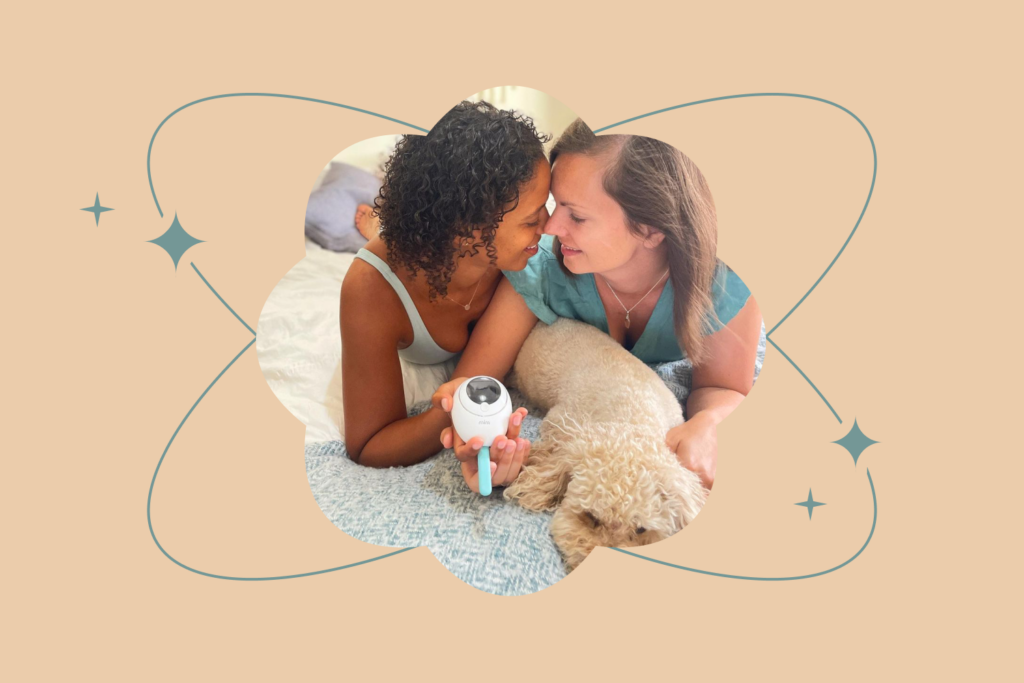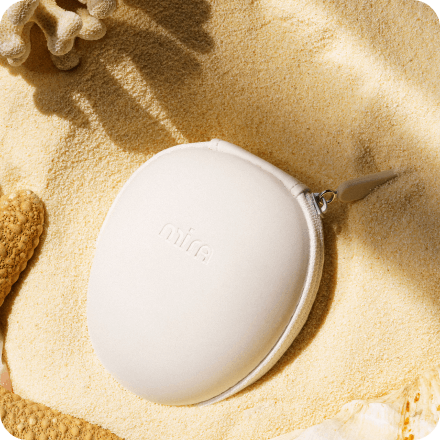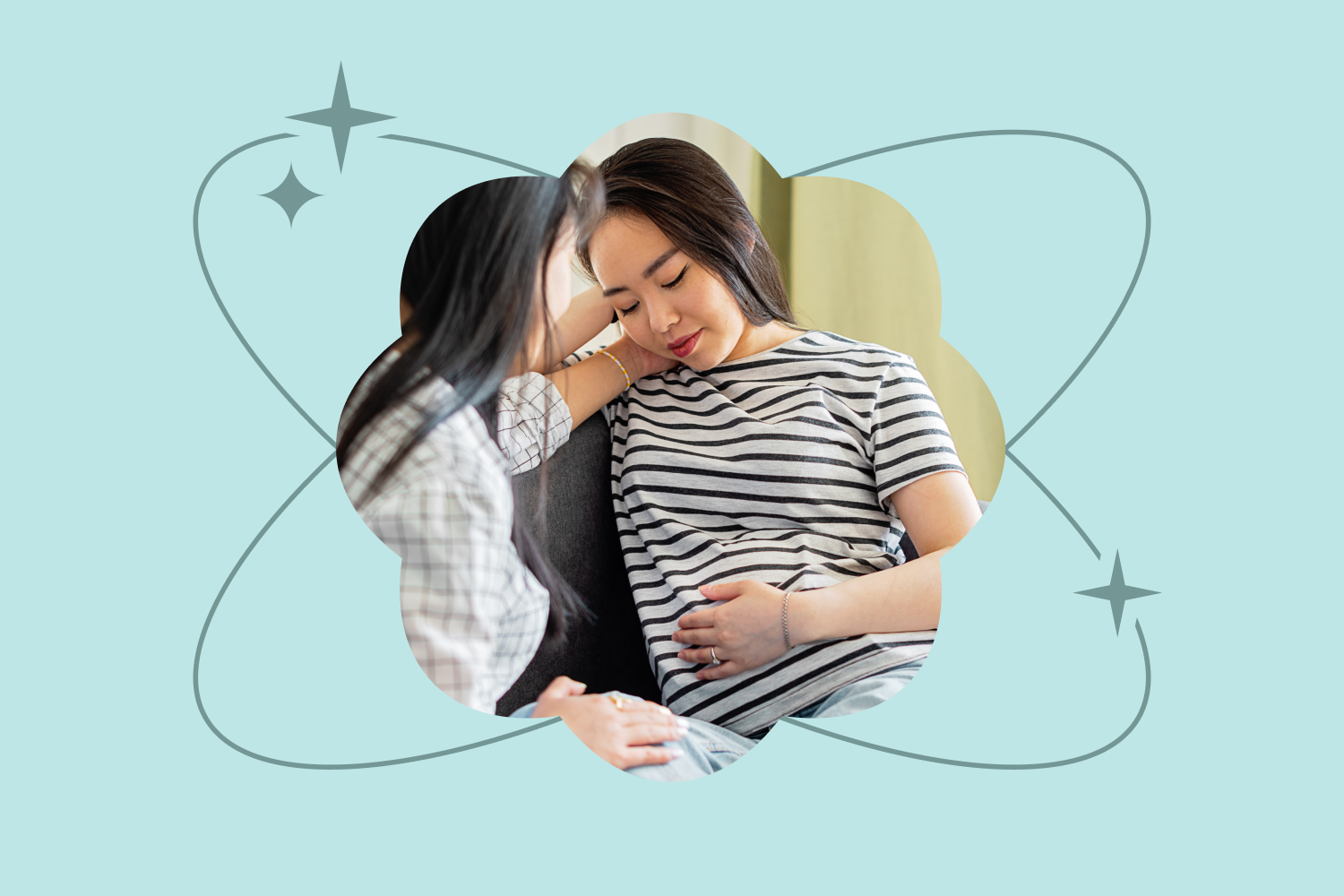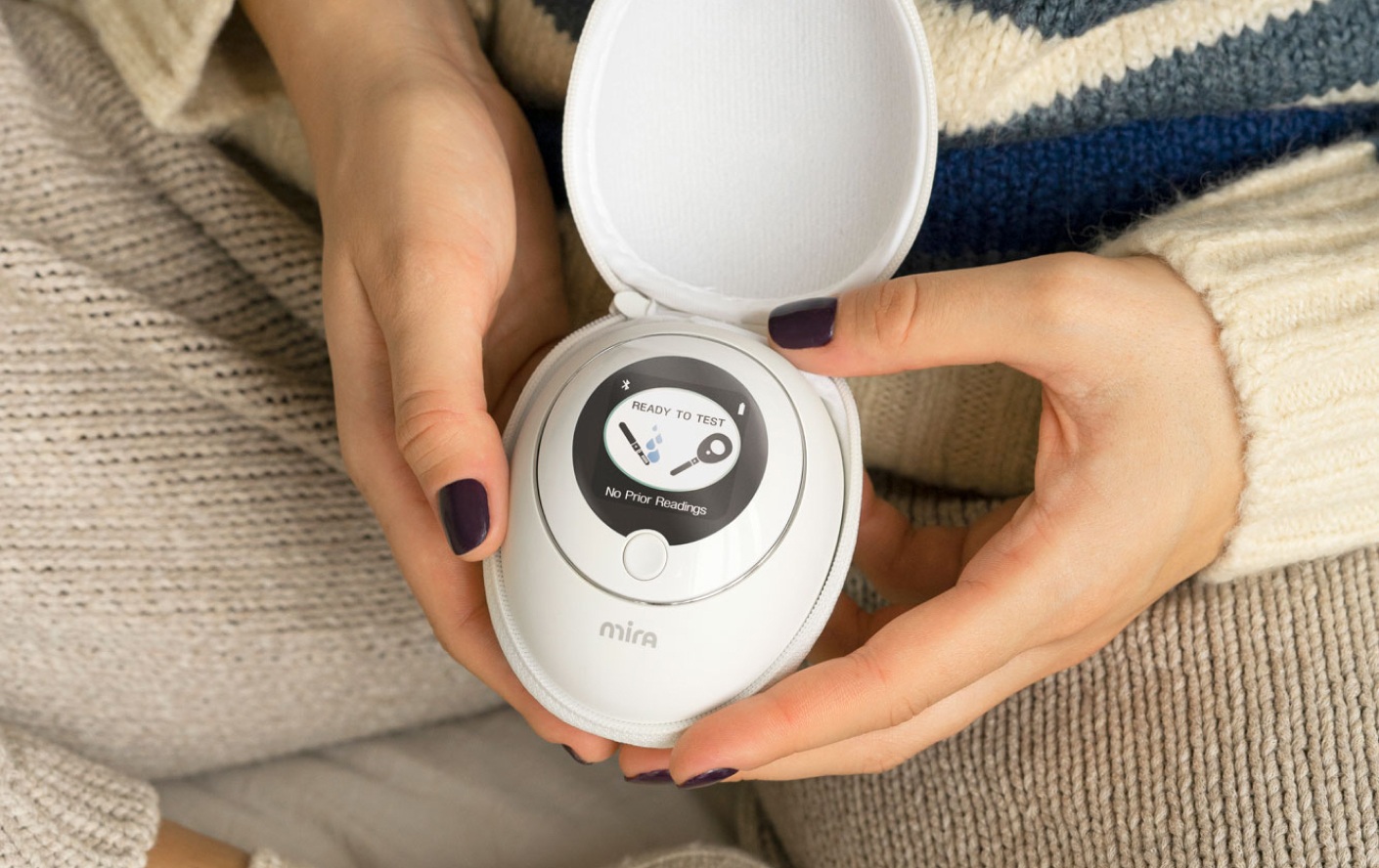6 Lesbian Pregnancy Options to Consider (TTC Guide)
Aspiring to have a family is a natural and beautiful dream shared by many, including LGBTQ+ individuals and couples. It is an exciting era in which various medical advancements and societal shifts have opened up a plethora of pathways for lesbian couples to have children!

Research indicates that over half of LGBTQ+ adults either have children or aspire to. In this post, we’ll delve into 6 viable options for lesbian couples to consider when planning their journey to parenthood!
If you’re looking to compare lesbian pregnancy options or options for lesbians who want to get pregnant, we’ve done the legwork for you. Read on for our guide on how lesbian couples can have a baby!
The aim of this article is purely educational. Mira is not designed to monitor any fertility treatment. Please always refer to your healthcare provider.
How can lesbian couples have a baby?
LGBTQ+ couples, particularly lesbian couples, have multiple pathways to parenthood. For those desiring biological connections, options include Intrauterine insemination (IUI), In Vitro Fertilization (IVF), and Intra-vaginal Insemination (IVI). For those preferring not to experience pregnancy, surrogacy, adoption, and foster care offer beautiful alternatives.
Remember, the journey to parenthood is deeply personal and unique, influenced by individual preferences and circumstances. In the diverse LGBTQ+ community, every family’s story celebrates love and unity.
Intrauterine insemination (IUI)
- The IUI Journey
In this fertility procedure, concentrated motile sperm are inserted directly into a woman’s uterus in the hopes of successful fertilization. While it’s not appropriate for all women, it is less expensive and invasive than IVF making it a popular choice. The procedure is usually done with a fertility provider, but at-home insemination is rising. Home insemination works best with fertility tracking to confirm the ovulation timing.
- Potential Outcomes
Overall success rates for IUI depend on many personal factors like age, overall fertility health, and the type of sperm used. For women under 38 years old, the chances of conceiving through IUI with no drugs are 1 to 5 percent. Success rates among lesbians are comparable to those of heterosexual couples. When drugs stimulate ovarian reserves, the chances of conceiving rise slightly to between 4 and 10 percent.
- How much does it cost?
Costs for IUI can vary dramatically depending on what is needed in your situation. Donor sperm, fertility medications, and even treatment procedures or monitoring will contribute to the overall cost of this procedure. A typical cycle can range from $500 to $4000, depending on multiple factors including insurance coverage.
- IUI Considerations
For lesbian couples considering pregnancy, IUI is a viable option. However, it’s essential to weigh all factors before making a decision. While IUI is less invasive than IVF, its success rate is typically lower, with pregnancy odds hovering around 15-20%.
In Vitro Fertilization (IVF)
- Understanding IVF
In vitro fertilization (IVF) is a fertility procedure that involves a lab setting to fertilize an egg (or eggs) with sperm. An IVF cycle consists of diagnostic testing, stimulating the ovaries to produce mature eggs, retrieving those eggs, and fertilizing them in a laboratory before then transferring the resulting embryo(s) into the uterus.
- How successful is it?
Success with IVF can depend on many factors, including the causes of infertility and the woman’s age. Generally, the younger the woman, the higher her odds of conceiving through IVF, but success rates vary depending on your age and overall health.
- What does it cost?
Due to the nature of this procedure and the medical interventions involved (like surgical egg removal), the costs for IVF can be high. For some, this may be prohibitive. Online fertility calculators say prices can range from $4,700 to $30,000 per cycle.
- Things to think about.
IVF is an involved procedure that can be time-consuming and expensive. Success rates vary widely and may or may not be covered by your insurance. Multiples are also possible with this procedure, as more than one embryo is expected to be transferred.
IVF offers the unique possibility for both women to be involved with reciprocal IVF, which means that both partners participate in the procedure by donating eggs or carrying the pregnancy.
Reciprocal IVF
- How does the procedure work?
Reciprocal IVF allows both partners to be biologically involved in the process. One partner provides the eggs, which are then fertilized in a lab with donor sperm, and the resulting embryos are implanted in the other partner, who carries the pregnancy.
- Success probability
The success rate for reciprocal IVF is comparable to traditional IVF and is influenced by similar factors.
- How much does it cost?
Reciprocal IVF costs generally range from $5000 to $30,000 per cycle. This pricing accounts for consultations, lab fees, medications, and procedures. However, remember that IVF may require multiple processes. Some insurance plans may cover part of these expenses.
- Weighing Reciprocal IVF
Reciprocal IVF allows both partners in a lesbian couple to have a biological role in having a baby. However, it can be costly, time-consuming, and requires careful consideration of legal factors.

At-home Intra-vaginal Insemination (IVI)
- At-home IVI Process Explained.
At-home Intra-vaginal Insemination (IVI) is the process of placing sperm into the vagina during the optimal window of the menstrual cycle to achieve pregnancy. Quality and accurate fertility tracking tools can significantly improve success by helping you identify peak fertility days!
- How successful is IVI?
The success rate of at-home IVI varies based on age, overall fertility health, and the type of sperm used, among other factors.
- Investment Overview
IVI is typically one of the most cost-effective methods of assisted reproduction, with costs mainly attributed to purchasing donor sperm and, possibly, fertility tracking.
- Points to Ponder
At-home IVI allows for a more private and comfortable setting. However, it may take several cycles to achieve pregnancy, and success rates can be lower than other methods.
Non-biological options for lesbian pregnancy
Surrogacy
- What is the success likelihood?
Surrogacy is an arrangement where another woman carries the baby for the pregnancy until birth. A traditional surrogate donates her eggs and carries the pregnancy for someone else. At the same time, a gestational carrier has the pregnancy and delivers the child.
- Surrogacy success rate
Surrogacy success rates vary greatly depending on your situation and the carrier’s health. Fertility centers in the US have a success rate of about 75%. Still, that number will vary greatly depending on your situation. The surrogate’s health, the eggs used, and other factors will all play a role. The odds are favorable once the surrogate is pregnant, though, with an approximately 95% chance a healthy baby will be born.
- Financial commitment
Costs for surrogacy can range greatly depending on where you live and the type of surrogacy you choose. In some places, payment to the surrogate is illegal. Still, you must also consider health care costs, legal fees, and other costs such as transportation. One clinic even breaks down what the cost of surrogacy could look like in the US. However, it’s important to note these are only guidelines, and your situation will be different.
- What points should you consider?
Surrogacy isn’t a guarantee of pregnancy; the usual issues can arise, like complications or even miscarriages. The pregnancy may also result in multiples, and there are legal issues to consider as medical and psychological screenings for the surrogate. Pursuing surrogacy can be a complicated decision with many factors at play.
Adoption/Fostering
- How does the adoption process work?
Several types of adoption are available, from public to private to international. Public adoption is done through your local child welfare system. In contrast, private adoption is usually done through an agency. An international adoption is where you adopt a child from another country.
In the case of fostering, you take in a child from the foster care system temporarily. The goal in promoting is for the child to be reunited with their family eventually, but this will vary on a case-by-case basis.
- A different measure of success
It’s hard to compare the success rates of other procedures to adoption or fostering. Unfortunately, not all jurisdictions have laws protecting discrimination based on sexual orientation, and this can be a prohibitive factor. We know same-sex adoption is rising, and same-sex couples are more likely to adopt or foster.
- Adoption costs explained
The costs involved in adoption or fostering will depend on the type of situation you choose. Public adoptions usually involve little expense, whereas private and international adoptions can average between $20,000 and $50,000. Your costs will depend on the fees and travel of your specific situation.
- What to keep in mind
Not all countries allow adoptions by same-sex couples, so international adoption may not be an option if you choose to reveal your sexual orientation. The steps for becoming an adoptive parent or a foster parent can take additional time, even years, before finding a match, not to mention the emotional toll the process can take. Every process is unique and will depend on the resources available to you.
Things to consider with lesbian pregnancy options
- Cost
The financial commitments of pursuing parenthood vary significantly depending on the chosen method. It’s essential to anticipate costs related to fertility treatments, legal services, or adoption processes. Numerous LGBTQ+-oriented grants and charities exist to help mitigate these costs, as do comprehensive guides on financing family-building journeys.
- Legal Aspects
It’s crucial to be informed about your local laws regarding LGBTQ+ parenting rights, as they can differ significantly across regions. Regardless of the pregnancy method, ensuring legal protection for your family can be necessary in many places.
- Health Factors
While the basic concept of pregnancy might seem straightforward, numerous health factors must be considered. Potential issues could arise regarding fertility, the health of the woman carrying the baby, or the baby’s health. Medical professionals specializing in assisted reproduction can provide guidance tailored to your situation.
- Emotional Wellness
Building a family is a profound and emotional journey. It can be a rollercoaster of emotions, with potential obstacles, making emotional support paramount. Having reliable support networks for you and your partner, including mental health professionals, support groups, or family and friends.
Take the Quiz!
Tell us your fertility goal and we'll give you a perfect product match
Lesbian pregnancy FAQs
How much does it cost for two females to have a baby?
The price of parenthood is highly variable for lesbian couples. The cost will ultimately be determined by which path you choose but depends on several factors like medical procedures involved, time off work, travel, and legal fees, to name a few.
How many IUI cycles does it take to get pregnant?
IUI success rates depend on many factors, and it is impossible to say how many cycles it will take to get pregnant. Repetition plays a role, and generally, the more cycles you undergo, the higher your chance of pregnancy; however, it does begin to lose effectiveness. IUI is not appropriate for all women, though, and attempting IUI regardless of any contraindications would have little success. Consulting with a fertility specialist is the best way to determine if IUI suits you.
Mira’s Editorial Process
All content produced by Mira meets stringent editorial standards, ensuring excellence and accuracy in language and medical precision. Every piece undergoes thorough fact-checking and review by qualified professionals. Check out our full editorial process to learn more.













